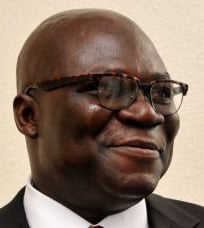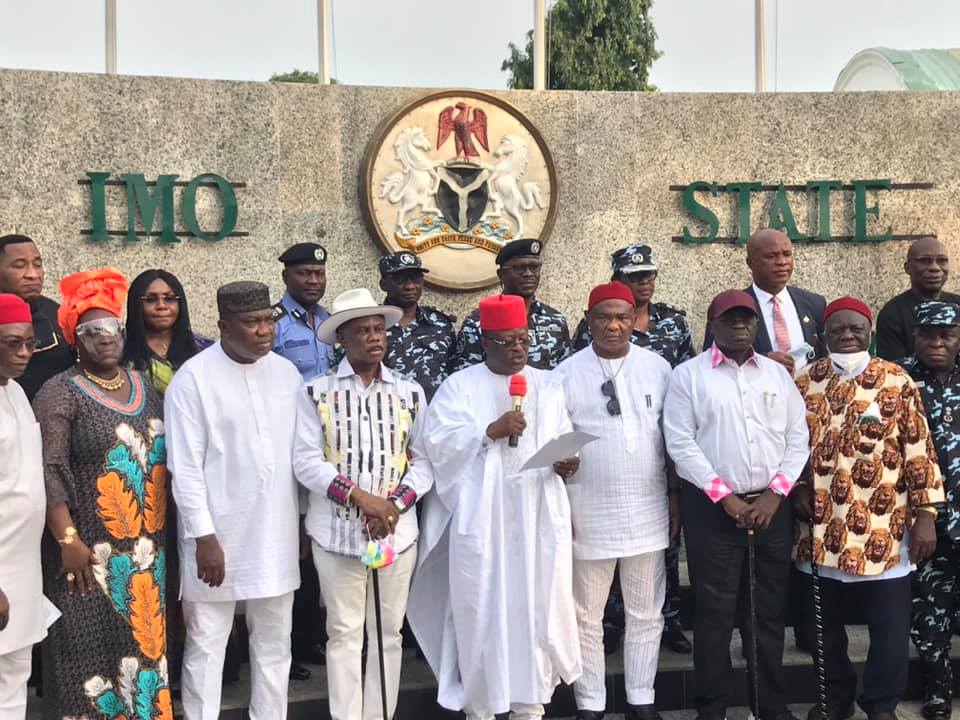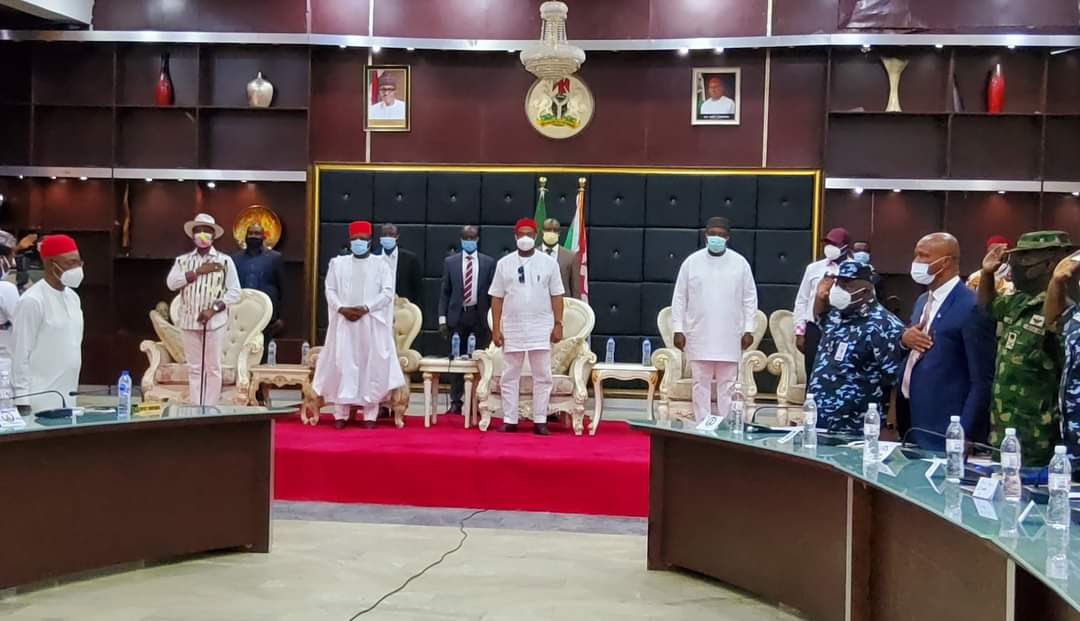The removal of former Inspector General of Police, Mohammed Adamu by President Muhammadu Buhari 27 days to the end of the three months extension that the President granted him on February 4, is now seen by those who opposed that extension as a vindication of their position. The official excuse at the time was that the President needed a period of three months to look for a proper replacement. or as Minister of Police Affairs, Muhammad Dingyadi put it, to “ensure a smooth handover”. This was pooh-poohed as a sign of absent-mindedness and sloppiness on the part of government. Adamu’s date of retirement was well known, and in line with standard practice, he must have served notice of his retirement.
The Police Act states clearly that the age of retirement for a serving officer is the age of 60 or 35 years in service or whichever comes first. This is on all fours with Civil Service Rules and Regulations. How on earth then would any one claim that more time would be needed to find a replacement? Adamu enlisted in the Nigerian Police Force on February 1, 1986. Senior Advocates of Nigeria – Femi Falana, Mike Ozekhome and Ebun Olu-Adegboruwa and others waded into the matter and argued loudly that the law does not contemplate a situation whereby a retired police officer will be appointed the Inspector General of Police and that effectively, Adamu’s continued stay in office meant that Nigeria did not have an Inspector General of Police. The Federal Government had its way. Adamu remained in office.
But the Nigeria Bar Association went to court. The lawyer representing the NBA, argued that Adamu’s continued stay in office was in contravention of Section 7 (3 and 6), and 215 (1)(a) of the 1999 Constitution and Section 18(8) of the Police Act and hence to that extent, the extension of his tenure was unlawful, null and void. The lawyers representing the NBA asked the court to direct Adamu to stop functioning as the IGP of Nigeria. Before the NBA suit, there was also a suit, with similar prayers, filed by Maxwell Opara Esq. Nigerians were however shocked when the now erstwhile IGP engaged the services of his own lawyers who purportedly argued that it is the President’s prerogative to hire and fire within the purview of Section 171 (1-6) of the 1999 Constitution, and hence nothing unlawful had been done and that in fact IGP Adamu’s tenure would not end until he has served for complete four years because the Police Act 2020 defines the tenure of an IGP to be four years.
Adamu became IGP on 15 January 2019. The new Police Act 2020 was signed into law by President Buhari on September 16, 2020. The fact that laws do not have retroactive effect is one of those elementary things sophomore law students understand. But here in the Adamu case, senior lawyers had the temerity to stand that principle on its head as an argument. In the NBA case, the Federal High Court has since fixed April 16 for judgement in the suit, after parties to the case adopted their written addresses. But with the removal of IGP Adamu on April 6, that case has now become mute and academic. The same Section 171 (1 – 6) that Adamu’s lawyers quoted in part, has now been used to “fire” him. I hope Adamu would not make the mistake of saying he would challenge his removal in court because these days, you never really know. There are many ambulance-chasing lawyers out there who would take on any brief and offer legal advice that fly in the face of the law and common sense. The Nigeria Bar Association should look into that. And while it is useful to test the law, judges must be firm in rebuking counsel who approach the courts with frivolous and vexatious cases that constitute an attempt to waste the time of the court.
Advertisement
As for former Inspector General of Police Mohammed Adamu, would it not have been better if he had taken his exit, most honourably, on February 1, the exact date he was supposed to leave service after 35 years? He could claim he was not in a position to disobey the Commander in Chief of the Armed Forces and President of Nigeria. but how about the greedy part of him that came forth, with the argument by his lawyers that he could stay in office till 2023? Wherever he is at the moment, he must be disturbed by the embarrassing manner of his exit last week. He was treated so shabbily he deserves our sympathy. But he is not getting any sympathy. The former IGP was on active duty in Owerri, Imo State where a group of yet unidentified gun men practically sacked the entire state and instilled fear into the people. In Owerri, they attacked the prison and set over 1, 800 inmates free. They burnt down vehicles at the Police Headquarters. They made an attempt on Government House. They later attacked police stations in Mbaitoli, Orlu, and Ehime Mbano and other LGAs.
The audacity and the impact were devastating. In neighbouring Abia state, the state Governor had to take a precautionary and pro-active step to impose curfew on two major cities of Umuahia and Aba. The South East was literally turned into a battlefield. The then IGP blamed the Indigenous People of Biafra (IPOB) and the Eastern Security Network (ESN) for the attacks. IPOB and ESN disagreed with him. They rejected the attempt to link them to the attacks. The former Inspector General of Police had gone to Owerri for an on-the-spot assessment when his removal was announced. Nobody alerted him. He left Owerri without the authority of the office that took him there. What makes it all sad and ugly is that Mohammed Adamu is now more likely to be remembered as the police chief who presided over police brutality, the #EndSARS melodrama, the failure of the police to ensure the safety of lives and properties under his watch, and as the police chief whose tenure was unlawfully extended and who eventually got disgraced out of office. Future Inspector Generals of Police should learn from his humiliation. It would not be wrong to say that he left the Nigeria Police Force worse than he met it.
Adamu’s successor: Usman Alkali Baba has since assumed office as the 21st indigenous Inspector General of Police. Unfortunately, this new IGP is starting off on a more controversial note. By appointing him, even if in an acting capacity, a number of questions have been raised – (1) about religion: why another Muslim as IGP of Nigeria, and (2) ethnicity: why does the President appoint only Northerners as IGP since 2015? and (3) competence: who is Usman Baba, what has he achieved? What is so special about him? and (4) abuse of due process: why does the President appoint Inspector Generals of Police without the involvement of the Police Council as stated in the Third Schedule, Section 215 (2) of the 1999 Constitution?
Advertisement
Religion remains a very sensitive subject in Nigeria. Muslims do not trust Christians and vice versa. The dividing line between the two major faiths in Nigeria has never been so sharply drawn as is now the case. Ethnicity is also a problem. President Buhari has been accused of a Northernisation and Islamisation agenda by his fiercest critics. Each time he makes an appointment, they draw attention to the religious and ethnic affiliation of the appointee. His aides have tried to debunk this but they have been most unsuccessful in getting the critics to change their minds. In governance, perception often times is more enduring than actual substance. However, with regard to the appointment of the IGP, it is a matter of fact that since 2015, all the three IGPs appointed by President Buhari have all been Muslim-Northerners: Ibrahim Idris (2016 – 2019); Mohammed Adamu (2019 – 2021) and Usman Baba (2021 – ). It has also been argued that the North has produced more IGPs than the South since the return to civilian rule in 1999. Well, that is not true. The South since 1999 has produced six IGPs (Musiliu Smith, Mustafa Balogun, Sunday Ehindero, Mike Okiro, Ogbonna Onovo and Solomon Arase). Before now the North had five IGPs (Hafiz Ringim, Mohammed Dikko, Suleiman Abba, Ibrahim Idris and Mohammed Adamu). Usman Baba is the sixth from the North. There you have it: it is now 6 -6. However, it seems to me that given all the concerns expressed about the South East and the marginalisation of the region, it would have made more sense to appoint a South Easterner as Nigeria’s new IGP. Or are there no Igbos in the top hierarchy of the Police? Since 1999, only two Igbos have made it to that top position (Okiro and Onovo). An Igbo IGP at this time would have been a wise choice.
On the question of competence, Usman Baba has impressive credentials on paper. He holds a Masters degree in Public Administration. He was until his appointment, the Deputy Inspector General in charge of the Criminal Investigation Department at the Police Headquarters. Before then, he served as Force Secretary. He has also been Commissioner of Police in Delta State and the Federal Capital Territory (FCT), and AIG in Zones 4, 5 and 7. When I reel out these credentials, the question most people ask is: And so? What exactly has he done?, they ask. A significant proportion of the people that Usman Baba is expected to serve express doubts about him. His media team has a lot of work to do. He himself has a lot more to do.
The remaining question is due process. The new IGP was appointed without any recourse to the Police Council. The President, after a fashion, took a unilateral decision to appoint Usman Baba as the Inspector General of Police of Nigeria. The problem continues to repeat itself in this regard. It is not enough to rely on Section 171 of the Constitution. No section of the Constitution exists in a silo. The Constitution should be read conjunctively, and here Section 171 stands in relation to Section 215 (1)(a) and Section 216 (1) of the same Constitution. The Police Council is the highest policy making body for the Police. It is a creation of section 153 of the 1999 Constitution. The Police Council has the President as Chairman, with all the 36 State Governors as members. The whole idea is that an Inspector General of Police appointed by the Police Council based on the recommendation of the Police Service Commission would understand the gravity of his mandate, and get the message that whereas he reports to the President, state governors, who may have no control over police operations are nevertheless, major stakeholders in the task of policing the country.
The reduction of the Police Council therefore, to a rubber stamp assembly, if and when it suits the President is in part the source of the “powerlessness” of Governors in their relationship with the Nigerian Police. Besides, there is really no indication that the Police Service Commission had a hand in the appointment of this new IGP. Members of the Police Service Commission apparently just heard the news on radio like everyone else. This abuse of due process, when measured in terms of costs, is a great disservice to the nation. It amounts, as counsel to NBA in the Mohammed Adamu case pointed out, breaking the laws of the land.
Advertisement
Usman Alkali Baba has assumed office at a very difficult time. There is widespread insecurity in the land. The police are ill-equipped and under-staffed. The people do not trust them. Police men themselves are “at war” with the same people they are paid to protect. It is not for nothing that police reform, police restructuring, or the creation of state police is part of the on-going Nigerian debate. It is most unfortunate, however, that IGP Baba has not shown any early signs that he understands the gravity of the problem he faces. On Friday last week, he reportedly held a meeting with “strategic zonal commanders” of the Police – whatever that means! He told his men that his priority is to “rejig police operations nationwide”. With due respect, this new police IGP should resist the temptation to turn the mouthing of “platitudes” into a habit. Nigerian security chiefs out of a lack of imagination and perhaps the narrow scope of their vocabulary tend to use the same phrases annoyingly: “rejig”, “architecture”; “operational rules”. Buba says he wants to “leave a legacy of policing with human face”. The way they abuse these words, we may need to launch a campaign to stop them from using words that either they do not understand or that mean nothing.
In about 48 hours after his assumption of office, IGP Usman Baba was presented with something to worry about when the five South East Governors and a few Igbo leaders at the end of a meeting on security in the South East declared the establishment of a security group to be known as “Ëbube Agu”. Nigerian Governors must be fascinated with animals, and their skills. In the South West there is a security network named “Amotekun”, the Yoruba word for Leopard. In the South East, “Ëbube Agu” means the glory or greatness of a Lion. In 2020, when the same South East Governors had tried to set up a regional security outfit like Amotekun in the South West and Shege Ka Fasa in the North, the erstwhile IGP told them to bury the thought. In December 2020, the Indigenous People of Biafra, the group led by Nnamdi Kanu and other non-state actors established the Eastern Security Network (ESN). What would be IGP Usman Baba’s response to “Ebube Agu”? The timing of the initiative is striking. The South East Governors did not even give Baba enough time to settle down in his new office. Given the worsening security situation in their region, they stand on a high moral ground.
But the details are fuzzy. “Ebube Agu” is nonetheless a fine case of the people trying to help themselves, a commentary on the failure of Nigeria’s centralised Police and an indication that state Governors are not as helpless as they claim to be in managing security.
Advertisement
Add a comment







